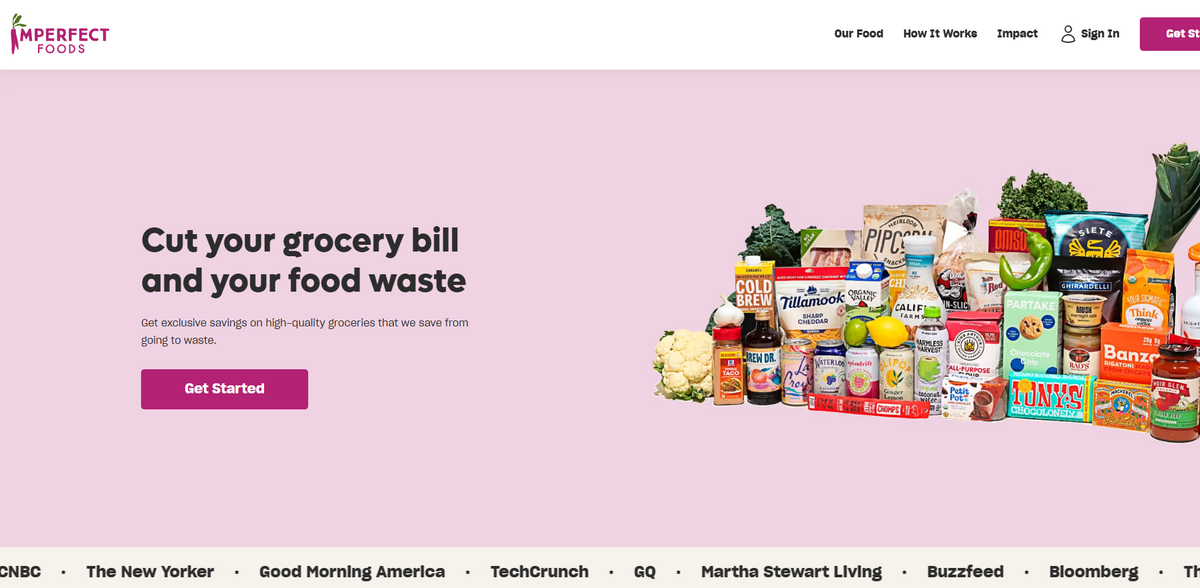What is Imperfect Foods?
CUT YOUR GROCERY BILL AND YOUR FOOD WASTE – a straightforward promise that sets the tone for a unique grocery delivery service focused on reducing food waste while offering exclusive savings on high-quality groceries. The concept is clear and innovative: get access to 1000+ items ranging from produce, meat, seafood, dairy, bakery, and snacks, all sourced in a sustainable way. The service is designed for ease and convenience – join for free by signing up and telling the platform food preferences, then let the service deliver produce, staples, and seasonal finds straight to the door every week.
Main Benefits to the Customer
The benefits extend far beyond simply lowering the grocery bill. Membership is free, and customers gain access to a wide variety of produce and pantry staples that help fight food waste. The key figures and facts include:
- Over 1000 items including high-quality produce, meat, seafood, dairy, bakery, and snacks
- The flexibility to skip an order or cancel anytime
- A commitment to reducing food waste with every single order
- Weekly deliveries on a fixed day to reduce emissions
- A unique shopping experience curated based on personal food preferences and seasonal availability
How the Service Really Works
A simple step-by-step process makes the service accessible. First, customers join for free and share their shopping preferences through a quick quiz. Then a shopping window and a delivery day are assigned based on the customer’s location. Every week, the cart comes pre-filled with food considered to be in line with individual tastes and the season’s best finds. It’s all very straightforward – just add and remove items to finalize the perfect order right before delivery. The process mirrors a natural flow, exactly like catching up with a friendly neighbor over coffee, except here it’s about groceries and sustainability.
The Quality You Can Taste
Quality is at the heart of the service, and trust is built with a strong commitment – if any delivery doesn’t live up to the quality standards, it’s made right away. Customers are encouraged to experience high-quality produce even when it looks a little different from what is typically seen on the supermarket shelves. The food may have unique characteristics, such as produce that is too big or too small, or meat cuts that are less familiar. This emphasis on quality proves that even when the food appears “imperfect” at first glance, its taste and nutritional value still shine through.
Understanding What Makes It “Imperfect”
The name “Imperfect Foods” is no misnomer. It highlights aspects that might normally lead to disposal in the conventional market. For instance, items like leftover ends and pieces, or produce with discoloration – these variations are perfectly normal and have no impact on taste. Additionally, excess inventory, packaging issues with outdated branding, items near their “best-by” date, or produce that is too big or too small due to unpredictable weather – all these factors are embraced with an innovative edge. This approach not only cuts grocery costs but also supports trusted farmers and producers who might otherwise struggle to sell their items.
The Impact on Food Waste and Sustainability
- SDG 2 – Zero Hunger: Addressing food scarcity by optimizing the use of available food supplies.
- SDG 12 – Responsible Consumption and Production: Encouraging sustainable consumption habits by reducing food waste.
- SDG 13 – Climate Action: Contributing to lower emissions through planned delivery schedules and reducing waste.
- SDG 15 – Life on Land: Supporting sustainable practices among farmers and producers to maintain healthy ecosystems.
Making a Difference One Delivery at a Time
Each week, the service makes a tangible difference. The pre-filled carts are a testament to thoughtful curation – influenced by seasonal availability and personalized food preferences. It’s not just about delivering groceries; it’s about fixing a broken food system and building a more sustainable future. With every order received, customers contribute to a larger mission of fighting food waste, saving 139 million pounds of food to date, and encouraging more responsible consumption patterns.


















